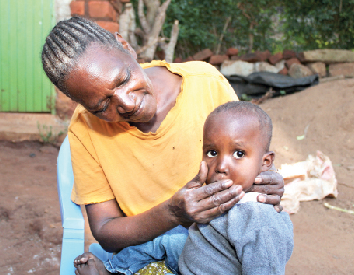Rising trend and burden of kinship parenting in society

Rose Mutheu* is 59 years old, although she looks further advanced in age with soft creasing around the edges of her eyes and sunken cheeks.
We find her in her home in Machakos county routinely feeding her livestock; three goats and a lean cow. She expresses her anxiety over the rapidly drying forage due to the scorching sun.
“I am raising five grandchildren on my own; the youngest is nearly one year while the oldest is in Class Eight. All of them belong to my second-born daughter. It is a very difficult situation,” said Mutheu.
Mutheu gave birth to three children, two boys, and one girl all of who are adults save for the last born who is in school. The widow takes on a forlorn look while talking about her daughter, whom she said first left her with her firstborn in 2008.
She says her daughter lied she was going to fetch water only to return a year later. A few months later she would bring and leave yet another daughter under the care of her mother.
“I have raised the two children solely on my own; I have fed them on porridge, clothed and educated them. I am their ‘new mother’,” said Mutheu.
The phenomenon of grandparents raising grandchildren looms large in society. According to government statistics, of the children that do not live with their biological parents, 40 per cent live with grandparents and 34 per cent with other relatives.
Kinship care comes as a result of a myriad of reasons including abandonment by parents, addiction, disease affliction, financial constraints and death.
The newly adopted Children Act 2022 favours family-based care alternatives as opposed to institutionalisation. Its emphasis is on the right of children to parental care through kinship, guardianship, adoption, kafaalah, foster care and child-headed households among others forms.
Despite the enactment of the law, kinship care is largely informal and receives very little support from the government. Caregivers and children continue to experience a myriad of problems.
Parental neglect
The grandmother of seven ekes out a living doing farm work and selling farm produce, undertakings she says barely meet their needs. She also says her daughter has utterly neglected the children.
“My daughter just travels from Nairobi and dumps them without any responsibility. She only contacts us when she is in trouble like when she has been arrested,” said Mutheu
“Sometimes I can make Sh300 other times a bit more, but it has never been enough to buy uniform, pay school fees, and buy food.”
Last year, her daughter made an uncharacteristic visit accompanied by her three children, she spent a few days before guilefully and nonchalantly abandoning the rest of her three children with her mother.
Mutheu says her daughter is irresponsible and even though she claims she works in the city, she never sends money to her.
“She should be arrested and forced to take care for her children. Parents who abandon their children should be reprimanded because it is not right,” she said.
Article 53 of the 2010 Constitution outlines the rights of the child where every child has the right to parental care, which includes equal responsibility of the mother and father to provide for the child whether married or not. Those that contravene the law are liable to a fine of up to Sh200,000 or imprisonment of a term not exceeding five years or both.
In the same village a few houses away, Margaret Mueni* sits rigidly in a wooden chair outside her house. The interview happens in a patch of shade thrown by a mango tree in her compound.
“The mother of these two children died in February 2022 after suffering from complications of a botched Caesarian section. Her two children came to live with me because the father refused to take care of them,” said Mueni.
Mueni recounts how she has had to toil excessively and dauntingly to provide for her grandchildren.
“The children are in PP2 and Grade Four. To educate them, I have to give the school 5kg of maize and 2kg of beans on top of paying Sh1,000 for PTA every month,” said Mueni.
Instead of settling into her old age in comfort and fulfillment, 70-year-old Mueni juggles between farming and raising her daughter’s children. It’s labourious back-breaking work that she finds progressively difficult at her age.
She painfully says the father of the children has refused to play any role in their upbringing.
Marriage and child Psychologist Tabitha Gikanga’ says although kinship parenting is ostensibly normalised, it is morally wrong.
“If I am giving my child to be raised by my parent, it means I was not ready to have the child in the first place,” said Gikang’a.
She says a parent is supposed to parent once and after that, the roles ought to change, so that they are also taken care of as they age.
Children who are raised by grandparents, she says, may not be adequately disciplined and may develop low self-esteem in the future.
“Children will not expressly demand to be raised by their parents, but there is that desire to have the presence of their parents,” says Gikang’a.
The caregiver, in this case, the parent will indulge in permissive parenting where they restrict themselves to avoid rebellion or protect the children, a phenomenon which impacts the overall outcome of the child,” she said.
Additionally, due to limited financial resources, grandparents raising grandchildren often have trouble supporting themselves and providing adequate housing, food and clothing for them.











